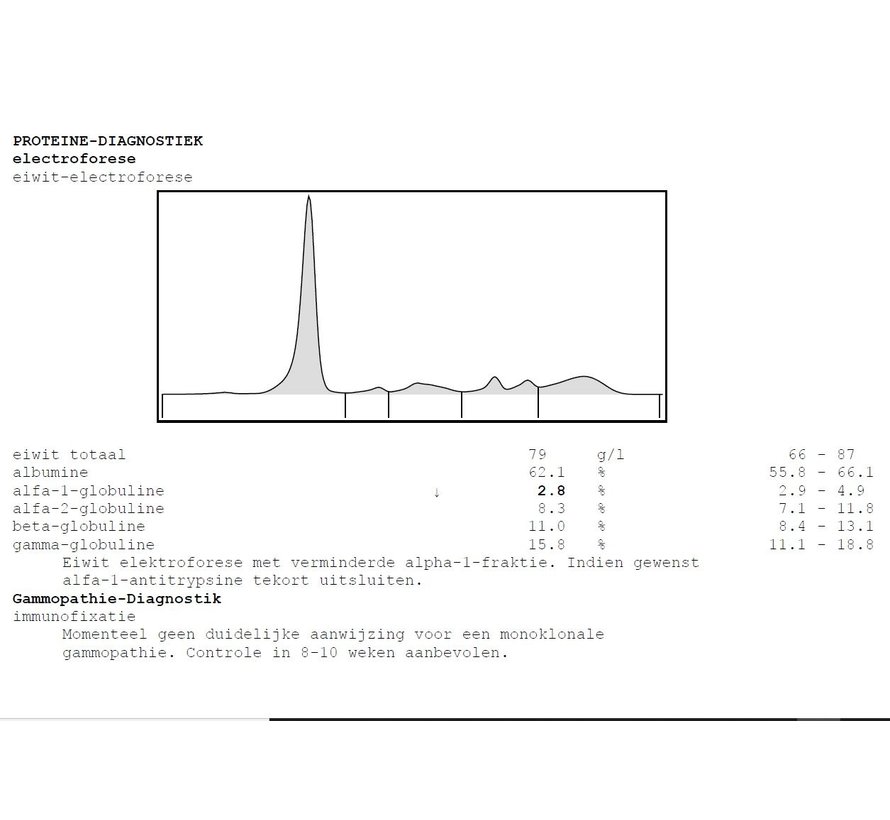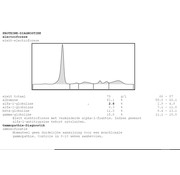Globulin protein electrophoresis and protein total
In this test, protein electroferesis and protein total (protein) from serum are determined.
This test is the same as protein spectrum
Globulins are a group of proteins in your blood. They are made in your liver by your immune system. Globulins play an important role in liver function, blood clotting and fighting infections. There are four main types of globulins. They are called alpha 1, alpha 2, beta and gamma. Just as there are different types of globulins, there are also different types of globulin tests. Among which are:
- Total protein test. This blood test measures two types of protein: globulin and albumin. If the protein level is low, it may mean you have liver or kidney disease.
- Serum protein electrophoresis. This blood test measures gamma globulins and other proteins in your blood. It can be used to diagnose a variety of conditions, including disorders of the immune system and a type of cancer called multiple myeloma.
Other names for globulin testing: Serum globulin electrophoresis, total protein
This test is the same as this test: https://www.bloodtesting.nl/eiwitspectrum-eiwitelectroferese-en-eiwit-totaal.html
Depending on the disease, differences in the composition of the protein fractions occur. protein electrophoresis is used to measure the different proteins. It also plays an important role in detecting monoclonal gammopathy. That is a condition in which certain antibodies, called immunoglobulins, are found in the blood or urine. Therefore, it is important to combine this examination with immunoglobulin IgA, IgG and IgM
.
Low globulin levels may be a sign of liver or kidney disease. High levels may indicate infection, inflammatory disease, or immune disorders.
High globulin levels may also indicate certain types of cancer, such as multiple myeloma, Hodgkin's disease or malignant lymphoma. However, abnormal results may be due to certain medications, dehydration or other factors. So always do this test in conjunction with other tests so that your practitioner can get a good understanding of the significance of the result. Globulin is a class of proteins in blood plasma. Electrophoresis is a technique for separating proteins based on their charge and size. Protein electrophoresis is a method to separate and quantify different protein fractions, such as albumin and globulins, to understand the protein distribution in the blood. Globulins are one part of the total protein spectrum that can be analyzed by electrophoresis. In short, globulins are specific proteins, while protein electrophoresis is the technique to separate and analyze proteins, including globulins.
Combining different blood tests can help to get a more complete picture. When analyzing the protein spectrum in the blood, you might consider combining it with the following blood tests:
- Complete Blood Count (CBC): this measures red blood cell, white blood cell and platelet counts, along with other parameters such as hemoglobin and hematocrit. This can provide information about anemia, infections and immune response.
- Chemical Blood Tests (Comprehensive Metabolic Panel, CMP): This involves measuring various chemicals in the blood, such as sodium, potassium, glucose, liver enzymes and renal function markers. This can provide insight into overall health status and organ function.
- Lipid profile: This measures cholesterol levels (HDL, LDL), triglycerides and other lipids in the blood. It provides information about the risk of cardiovascular disease.
- Inflammatory markers: Measurements of inflammatory markers such as C-reactive protein (Hs-CRP) and erythrocyte sedimentation rate (ESR or BSE) may indicate inflammation or infection.
- Hormone levels: Depending on symptoms and goals, hormone levels such as thyroid hormones (TSH, FT3, FT4), sex hormones and cortisol may be relevant.
- Specific Diagnostic Tests: If a particular disease or condition is suspected, targeted diagnostic tests such as blood glucose for diabetes, markers for autoimmune diseases or tumor markers can be added.
- Urinalysis: In addition to blood tests, a urinalysis can provide additional information about kidney function, possible infections and other health issues.













